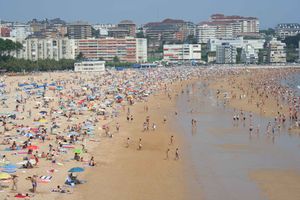Difference between revisions of "Template:This weeks featured article"
From MarineSpecies Traits Wiki
(→Coastal zone characteristics) |
(→Coastal zone characteristics) |
||
| Line 1: | Line 1: | ||
==Coastal zone characteristics== | ==Coastal zone characteristics== | ||
| − | [[Image: | + | [[Image:Beach.JPG|thumb|Fig. 1. Sandy coast. Source: [http://www.dhigroup.com DHI]]] |
Being the interface between the land and the ocean, coastal areas are affected by highly dynamic processes. Coastal spaces also support unique and especially fragile ecosystems, being areas of great environmental and aesthetic value. | Being the interface between the land and the ocean, coastal areas are affected by highly dynamic processes. Coastal spaces also support unique and especially fragile ecosystems, being areas of great environmental and aesthetic value. | ||
For instance, eight of the forty priority habitats listed in the Conservation of Natural Habitats and of Wild Fauna and Flora Directive are coastal. Approximately a third of the Union's wetlands are located on the coast, as well as more than thirty per cent of the Special Protection Areas designated under the Conservation of Wild Birds Directive. (For more information on these Directives see Bird Directive, Habitat Directive, NATURA 2000) | For instance, eight of the forty priority habitats listed in the Conservation of Natural Habitats and of Wild Fauna and Flora Directive are coastal. Approximately a third of the Union's wetlands are located on the coast, as well as more than thirty per cent of the Special Protection Areas designated under the Conservation of Wild Birds Directive. (For more information on these Directives see Bird Directive, Habitat Directive, NATURA 2000) | ||
Revision as of 13:09, 13 May 2008
Coastal zone characteristics

Fig. 1. Sandy coast. Source: DHI
Being the interface between the land and the ocean, coastal areas are affected by highly dynamic processes. Coastal spaces also support unique and especially fragile ecosystems, being areas of great environmental and aesthetic value.
For instance, eight of the forty priority habitats listed in the Conservation of Natural Habitats and of Wild Fauna and Flora Directive are coastal. Approximately a third of the Union's wetlands are located on the coast, as well as more than thirty per cent of the Special Protection Areas designated under the Conservation of Wild Birds Directive. (For more information on these Directives see Bird Directive, Habitat Directive, NATURA 2000)
